GEORGE McGREGOR - Detroit's busiest drummer.
There can't be many people who have seen active military service as a teenager in Korea, played music for some of the most famous doyens and despots in the world, yet enjoyed a long and distinguished career as a musician and record producer in one of the most creative eras of popular music ever. George McGregor has. Over five decades, beginning in the mid 1950s, he played drums on everything from marching bands to Motown with a technical proficiency and distinctive style that made him one of the premier military beaters, and one of the most in-demand recording session players in Detroit. His song writing and production prowess was featured on hundreds of recordings, for a wide variety of artists, locally and nationally, and he provided percussion panache on thousands of commercials, radio and tv jingles and movie soundtracks. McGregor's recollections of his time in the pop music 'business' are candid, direct and brutally honest, and provide a tantalising insight into the seamier aspects of the people, places and practices that characterized his time amidst the frenzied drive for commercial success in Detroit throughout the 1960s and 1970s.
His interest in music began in his early teens at Hutchins Junior High School on the west side of Detroit. “Popcorn Wylie, Barrett Strong, Smokey and Aretha all went to my school at that time and Paul Riser is my cousin, so there was a lot of interest in music back then. In 1955 I helped start the first ever black drum corps in the nation. We were called the Detroit Thunderbirds and we came third in a national competition. By the time I was ready to graduate in 1958, one of my teachers, Mr. William Rocky, who played flute with the Detroit Symphony, suggested I join the military to develop my talents further. He wrote letters to the military band people in Washington, D.C. recommending me to them. He had taught me how to write orchestrations from when I was fifteen, so he knew my talent.” McGregor was enrolled at the U.S.Naval School of Music in Washington and began studying percussion. “I was proud to have joined the programme 'cause usually you had to already have a Bachelor's degree to get in. I wasn't there long before they shipped me to off to Missouri for my basic training and then I was sent to Korea as a combat soldier, and a member of the band. I was in the DMZ ( De Militarized Zone) in combat for a while, then they sent me back to Seoul to play in the main band full time. We played for Dwight D.Eisenhower, Haile Selassie, Sheng Kai Shek, Hoe Chi Min and many other dignitaries at these big diplomatic ceremonies over there. I came back to the States in 1960 and was based in DC again. That's when we played for John F. Kennedy and the Russian leader Nikita Khrushchev but there was a lot of discrimination in the military back then and I didn't like it, even though I could have had a career with them.” He decided to resign from the military and gained an honourable discharge in 1962 before heading back home to Detroit. “I knew what was going on 'cause I'd heard all these hit songs on the radio and on jukeboxes and I knew they were being played by all the cats I had grown up with. It was an easy decision.”
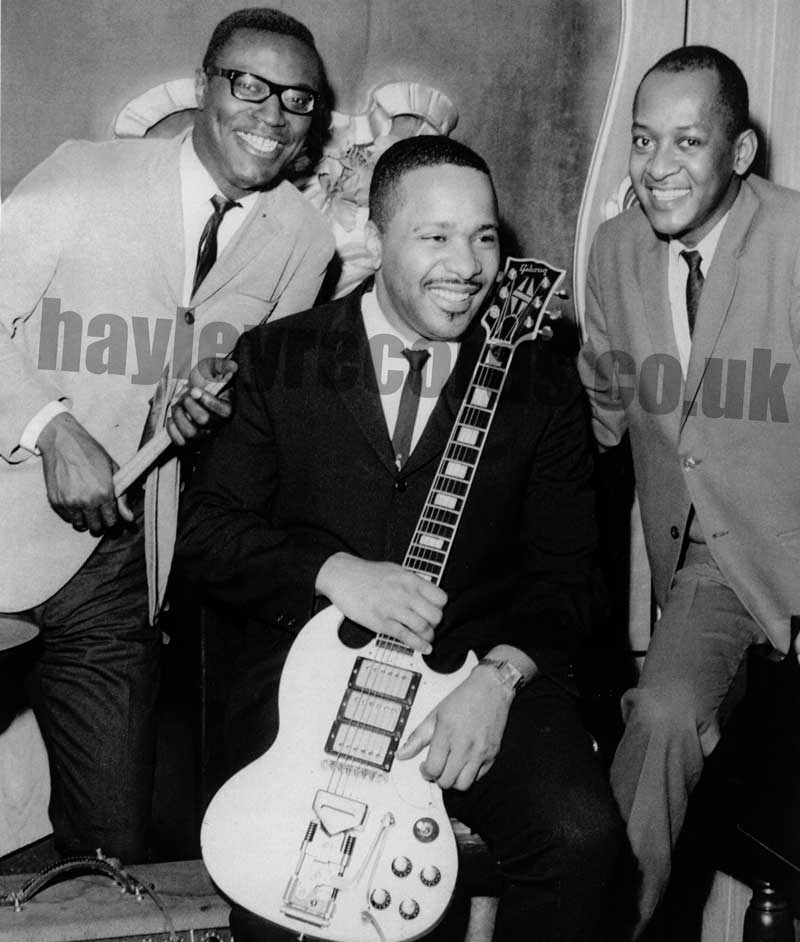
The Don Davis Trio l to r George McGregor, Don Davis and Clarence McCleod
Ironically, George McGregor's first employment back in Detroit wasn't in music at all. “I got a job selling insurance for $300 a week. I was earning $100 playing clubs plus I started doing recording sessions too. I could read music and write charts so there was plenty of work. The first recording session I did was for Johnnie Mae Matthews on Timmy Shaw – 'Send you back to Georgia' but then I did a lot for Mike Hanks - Lee Rogers, The Peps, Dee Edwards and others. Rudy Robinson was around then and he was a great guy to work with. I always got along with Mike Hanks – he was easy going. He always had a frown on his face but it was a cover. He would give everything he had away. That's when I met Don Davis. We had a trio I started with him and a piano player called Clarence McCleod. We would play in clubs throughout the city and sometimes out in Michigan. I didn't want my name up front so I called it the Don Davis Trio. Don was a very accomplished guitarist, he had studied under Wes Montgomery, but didn't have the confidence. He didn't realise how good he was. He did a lot of sessions as a guitarist around the recording studios. Don got me over to Thelma Records run by Mr. and Mrs. Coleman. It was named after their daughter who had been married to Berry Gordy. I did sessions for Emanuel Laskey, Martha Starr and their other artists. Don Mancha, Kingfish and Clay McMurray were around then. I did quite few sessions for Earnest Burt too. He had Magic City Records. I liked Earnest. In fact, I was with him the night he was killed. He had dropped me off after a session and was going off to a party. He was all over town with different women and was meeting this woman he knew. I guess they got into it and her son got involved and shot him.” The camaraderie among musicians was high throughout McGregor's tenure, even if it did get out of hand on at least one occasion. “We had an uncommon love between us and we did tease each other. We were like big kids with sibling rivalry. I can't think of one musician who killed another one. Joe Hunter was shot once out at Belle Isle and they said it was Dave Hamilton, but it couldn't have been 'cause Dave pulled him out of the water. I think some other guy did it and ran off.” McGregor's real animosity is reserved for club owners and their underhand methods of pay avoidance. “Most club owners were assholes who would do whatever they could to try and trim your money down. They would tell us that the crowd was too small, or the crowd didn't like what we were playing - all kinds of excuses like that. Guns were drawn on occasions, I can tell you that! It was different with the guys who owned and ran the studios – they knew that if they didn't pay us we wouldn't work for them again, and the word would get out.”
By 1965 George McGregor was one of the busiest drummers in Detroit not to work for Motown. “I did a couple of sessions in the late 60s for them. That's me on 'Ain't no mountain high enough' and 'Ain't nothing like the real thing'for Marvin and Tammi, but I didn't need them 'cause I was so busy with everything else. I did most of Edwin Starr's things with Motown 'cause Edwin didn't like to record at their studio on Grand Boulevard – he liked Golden World and would record there. Back in '63 I was with Eddie 'Bongo' (Brown) when he introduced me to Mickey Stevenson. Eddie told him I was a drummer and that I could write good songs too. Mickey told me that if I brought any songs to him that he would get 75% and I would get the rest, so I told him to kiss my ass. I was tight with Benny Benjamin and he told me that they didn't want me there 'cause they didn't like my style but I didn't care. Later on, I became good friends with Kim Weston who told me how important Mickey was to the whole Motown thing. Berry Gordy could have never done it without him 'cause Mickey knew the business and most of the key players in it through his mom, Kitty Stevenson, who was a performer and had taken him on the road with her since he was a kid in the 40s and 50s and introduced him around. The rest of them didn't know what they were doing. Mickey was the man on the street. It was Mickey that brought in most of the musicians, writers and key people to the operation.” The completion of the Golden World recording facility on Davison added an even wider dimension to the recording scene in the city. “In 1964 Mr. Wingate spent $500,000 of his own money to build that studio and it gave us all a platform to work from. Mr. Wingate was a 'numbers man' – he made a lot of money from illicit gambling and then he put his money into music and he built the Twenty Grand motel later too. I guess it was so that he could 'clean' his money. He was a good guy to work for though – he was very generous and would always pay us in cash. I remember one time when the studio piano, which was real old and on it's last legs, had just been tuned before a session and Earl (Van Dyke) came in to use it. Earl's style was to really hammer the keys and after a few minutes of him playing it, it was out of tune again. Earl just stood up and walked out. So Mr. Wingate said to this assistant who used to follow him around 'Go and dig me up some money'. So, about an hour later this guy comes back in with a couple of what looked like coffee tins and gives them to Mr. Wingate. He opened the first one and started pulling huge rolls of $1000 bills out but I guess the damp had got to them, wherever he had buried them, and they were all chewed away and couldn't be used. Same with the other one. He sends the guy out again and when he came back the money was OK. He peeled off $4000 out of the tins and sent me and Mike Terry out to buy a new piano. True story. You have to remember that back then, in many of the black communities, the 'numbers man' was the banker to a lot of people 'cause the banks wouldn't let us open accounts. So the 'numbers man' would lend people money to open record stores or other kinds of small businesses. They would help people out with rent and food sometimes too.”
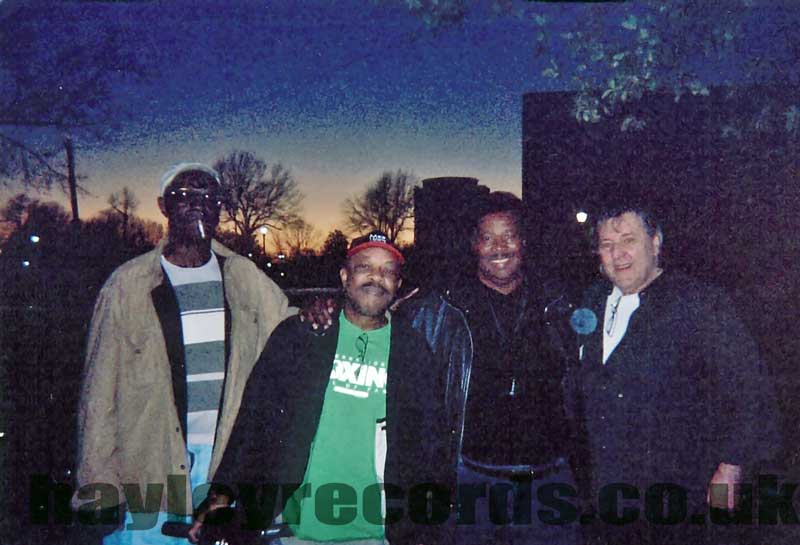
l to r George McGregor, Eddie Willis, Wilson Williams, Bob Babbitt
McGregor's foray into the recording scene intensified as the success levels rose.“I became the studio drummer at Golden World and they used me on most of their stuff, unless they wanted a different sound, when they might bring Uriel or Pistol in. I was getting a lot of sessions over at United Sound too, and played on a lot of Ollie McLaughlin's stuff, Brunswick stuff that Sonny Sanders would bring to Detroit and a lot of 'outside' productions. A lot of the big companies wanted to cash in on the success of Motown, so they would send their people to record with us. I applied to join the Detroit Symphony Orchestra around that time 'cause I felt so confident in all aspects of my playing, but they didn't even send me an application. There was a lot of racial segregation back then, even in music. We were getting $10 a side when the DSO people were getting $69 every three hours. Yet we were all paying the same Union dues. Our Union was Local number 5 and it didn't do a lot to help us. I remember when 'Cool Jerk' hit and we were expecting to get royalties on it but they said they couldn't find the contracts. I got paid $10 for that session and that was it! I never got a royalty cheque on any of the tunes I played on, whether they were hits or not.” Pop music was not the only recording work many of the musicians in Detroit made money from. “We did a lot of work for Artie Fields on jingles and tv or radio commercials and vibe player Jack Brokensa was a great writer of movie scores, so we would do that too – usually at United. That was probably the most fun and the most challenging to all of us. We were all accomplished musicians and we liked being challenged. Most of the pop music stuff was real easy and we could stroll through it pretty quickly – that why producers from all over liked working with us - we would save them studio time money.”
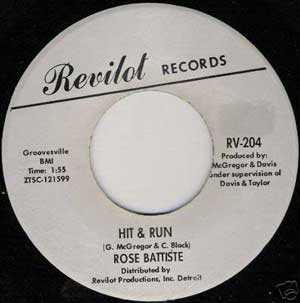
He gained notoriety as a song writer and producer too, as the 1960s progressed, but only after an initial struggle. “When I came back to Detroit I caught hell from the likes of George Clinton, Al Kent and Don Davis 'cause they wouldn't let me get my songs through. I was trying to write music using the full range of components, like I'd been taught at the Military Academy – the type of stuff Paul Riser was doing with violas and cellos as well as strings. They were just writing what I called 'Bubble gum pop'. Tobi Lark told me that they knew that if I was given a real chance I would have taken off – that's why they were blocking me. LeBaron Taylor was in my corner. He introduced me to Thom Bell, when he was in town one time, and told him that I wrote the type of material Burt Bacharach was writing. He (Bell) told me that I should go to either New York or LA to get a better chance.” McGregor's loyalty was to Detroit however. “LeBaron gave me a chance so I gave him 'Hit and run' that he cut on Rose Batiste.I wrote that alone but other people's names were always showing up on my songs – I would write with Cody Black but he didn't add anything to that song. I produced that song too – alone. It almost came to blows when I found out that Don Davis had put his name on it as producer and also added 'Under supervision' of him and Lebaron. I was SO mad. 'I'm satisfied' ended up on the San Remo strings but that one came about 'cause we used to play it live at the Frolic Club as the Don Davis Trio. We went to the studio one night and cut it.
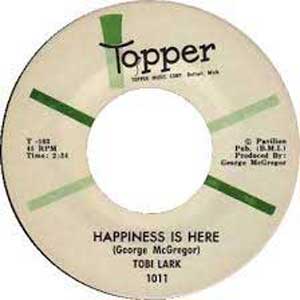
I also did a couple of my things on Barbara Mercer over at Golden World too. Mr. Wingate gave me that chance. I wrote 'Happiness is here' on her and 'Just penciled in.' They didn't like 'Happiness' is here' when it was finished so I bought the track from Mr. Wingate for $500 and later, when Dave Hamilton got some investment on his label, did it on Tobi Lark. General Motors were interested in the track. They were thinking of using it on a Chevy commercial but it didn't happen. 'Just penciled in' ended up at Motown. When Mr. Wingate sold everything to Berry Gordy it was kinda chaotic around the Golden World building and people snatched tapes. Don Davis took that one and sold it to Motown.”
By 1967 he had achieved a breakthrough of sorts by being hired as Musical Director for Sidra (pronounced 'see - drah') Records. “Sidra was owned by two white guys, Ray Jackson and Joe Casey, and a black guy Joe Brown. Joe Casey's kids recorded for us. They were called Ronnie and Robyn. They gave me a chance to recruit artists, write and produce, so I got right to it. We had the Precisions, Barbara Mercer, Timmy Willis and I used Mike Terry to arrange. The first thing we cut on the Precisions was 'Such misery' which did OK locally and then we had 'Why girl'. Our tactics were to see what kinda thing Motown were putting out on the Temps and then do the opposite – if they put a ballad out we would put something out up tempo. If they put something funkier, we would put something smooth out, and it was working. It was driving them crazy over there. Paul Williams and Otis (Williams) of the Temps told me this themselves. On the third release we kinda got hijacked 'cause Mike Valvano and Charlie Basaline came in and convinced the owners to cut one of their songs 'If this is love (I'd rather be lonely)' on the group. It should never have been released as the A side – we should have gone with 'You'll soon be gone'. We lost momentum. I was told later that Motown had paid Mike and Charlie $10,000 to go over to us to wreck the system, by putting their song out on them. The Precisions were as good as the Temps and should have been a lot bigger than they were. In the end, there was a lot of politicking that destroyed us – I guess that's what Motown wanted.” Despite the disappointments, Sidra material did earn money for the company and did produce small scale hits, including 'Mr. Soul Satisfaction' for Timmy Willis. “I liked working with him and wrote a few things just for him. We did 'Such misery' on Timmy first but then decided to put it out on the Precisions to kinda launch them. 'Mr. Soul Satisfaction' did well for us – I wrote that one alone too.” Another Sidra artist to benefit from the talents of Messrs. Terry and McGregor was Barbara Mercer. “We bought up her contract from Mr. Wingate and wrote especially for her. Me, Mike Terry and Doris McNeil, who was really good with lyrics, did some songs on her. We cut 'Call on me' and 'So real' at Sidra with another tune called 'In my window', which we didn't put out. I usually liked to record three tunes at a session and then choose the best two for release. Mike did great arrangements on those tunes. They put it out locally first, then Capitol picked it up nationally so we did a different mix on it. We were disappointed it didn't do better.”
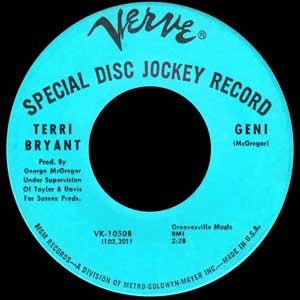
Despite the eventual demise of the Sidra/Drew operation, McGregor continued to write songs, play on sessions and produce new projects. “I wrote a song called 'Geni and the magic lamp' which I wanted to put with Aretha Franklin because I knew some of her people, but Don Davis took it and cut it on Mavis Staples first. I produced the track on a girl LeBaron Taylor brought in, Terri Bryant, but Pat Lewis sang on the demo version first. That's why Don gave her a writer's credit I think and George Clinton got a credit too but I don't know what he did on it! Don was an asshole with things like this and did it to a lot of other people too.” The move to writing and producing created several key changes in the way he approached recording. “If I produced a session I usually would not play drums on it 'cause I couldn't see the big picture and might miss something on the recording. At that time, we would cut the session first and then shop it to different companies later. If I came up with songs I would assemble the musicians on the understanding that if I got a deal they would get a share of it for playing. We had a real tight bond and trusted each other so there was a lot of honesty among us. We supported each other. I would usually go to New York to get a deal 'cause that was the closest, and best, place to get to the record companies. I got a deal with Tobi Lark at Cotillion, Bettye Lavette at Epic, Ruby Andrews at ABC, Gwen Owens at Jubilee and later got Rena Scott with Epic too on my songs.” McGregor got the chance to coordinate recording for another production company when he was approached by Uptight Productions. “That was owned by Marvin Figgens and Arnold Wright. They had made some money and wanted to get into the business but didn't really know how to go about it. That's why they brought me in. It was quite common at that time for local, successful, businessmen to invest in music, and the rewards could be great if they got hits. We had Gaslight, which was Oliver Cheatham's group, who cut three of my songs 'I'm only a man' , 'Just because of you' and 'I'm gonna get you'. The company really liked 'I'm only a man' and put the same recording out again under a different group name – Butch and the Newports. 'Butch' was Oliver Cheatham's nickname. Then we had Little Rena Scott, who recorded 'I just can't forget that boy', 'Testify' and ' I finally found a love'. We got all of those tunes with Epic. I also did a tune that I wrote with Almeta Latimore called 'La la' but we went down to Memphis to record 'cause I wanted a different sound. We went to Stax. She was a good writer and had a hell of a voice.”
George McGregor's direct contribution to one of the most creative periods in popular music is significant. He played on, literally, hundreds of songs, wrote and produced scores more and became an influential presence in all aspects of the Detroit recording industry. Detroit's busiest drummer!
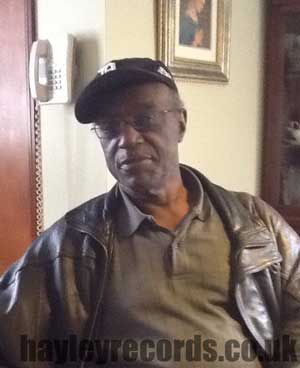
Ed and Sue Wolfrum all rights reserved 2015
A small sample of the many great Detroit records on which George McGregor played drums.
EDWIN STARR You're my mellow, Back Street, SOS, Headline news.
DARRELL BANKS/JJ BARNES Our love (is in the pocket)
THERESA LINDSEY Prepared to love you
LITTLE CARL CARLTON Competition ain't nothing
DENA BARNES If you ever walk out of my life
DOTTIE & MILLIE Talking about my baby, Nothing in this world
TOBI LARK Happiness is here, Challenge my love
EMANUEL LASKEY Peace loving man, Don't lead me on baby, Sweet lies.
FABULOUS PEPS My love looks good on you, Speak your peace.
PEOPLE'S CHOICE Saving my love for you
ANN PERRY That's the way he is
ROSE BATISTE Hit and run, I miss my baby, Holding hands
GENE CHANDLER Mr. Big shot
JACKIE WILSON Higher and higher, Whispers.
TONY & TYRONE Please operator
LOLLIPOPS Loving good feeling
FASCINATIONS Girls are out to get you
DEON JACKSON That's what you do to me.
LEAH DAWSON My mechanical man
BILLY KENNEDY Sweet things, Groovy generation.
STANLEY MITCHELL Get it baby
...and so many more
Rob 'The renegade' Moss
March 2015
http://www.hayleyrecords.co.uk
Related Source Magazine Articles
Author Profile: Rob Moss
Rob Moss
Rob Moss is a contributor at Soul Source, covering Northern Soul, Rare Soul, and modern soul scene stories.
Rob Moss has been a Soul Source member since .
No custom author profile added yet
Explore more of their work on their author profile page.

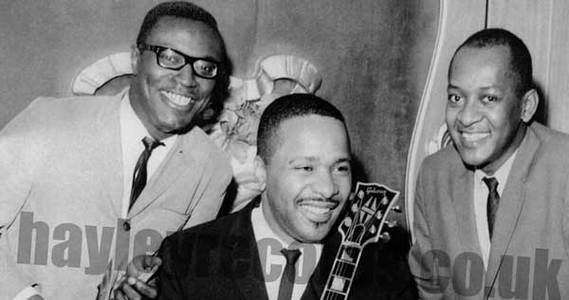
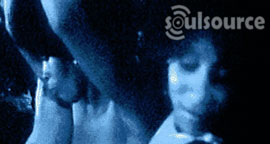
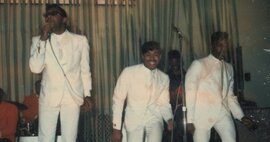

Recommended Comments
Get involved with Soul Source